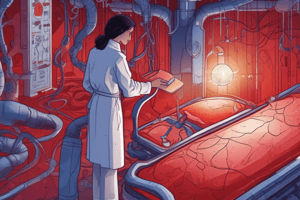Podcast
Questions and Answers
The ______ is also known as the rhesus antigen.
The ______ is also known as the rhesus antigen.
Rh factor
What are the two main types of antigens found on red blood cells?
What are the two main types of antigens found on red blood cells?
- Rh antigens and IgM antigens
- ABO antigens and Rh antigens (correct)
- ABO antigens and IgG antigens
- A antigens and B antigens
Individuals with type O blood possess both A and B antibodies.
Individuals with type O blood possess both A and B antibodies.
True (A)
What is the term used to describe the clumping of red blood cells when incompatible blood types are mixed?
What is the term used to describe the clumping of red blood cells when incompatible blood types are mixed?
How are agglutinins typically acquired?
How are agglutinins typically acquired?
Which of the following genotypes represents type B blood?
Which of the following genotypes represents type B blood?
Type AB blood is known as the universal donor.
Type AB blood is known as the universal donor.
What is the significance of the Rh factor in relation to blood transfusions?
What is the significance of the Rh factor in relation to blood transfusions?
Which of the following represents a potential consequence of Rh incompatibility during pregnancy?
Which of the following represents a potential consequence of Rh incompatibility during pregnancy?
Maternal antibodies against the Rh factor can cross the placenta and affect the developing fetus.
Maternal antibodies against the Rh factor can cross the placenta and affect the developing fetus.
How can Hemolytic Disease of the Newborn be prevented?
How can Hemolytic Disease of the Newborn be prevented?
The treatment for Hemolytic Disease of the Newborn involves repetitive removal of ______ blood and replacement with Rh-negative blood.
The treatment for Hemolytic Disease of the Newborn involves repetitive removal of ______ blood and replacement with Rh-negative blood.
What are the potential consequences of a transfusion reaction?
What are the potential consequences of a transfusion reaction?
Which type of immunoglobulin typically triggers immediate hemolysis in a transfusion reaction?
Which type of immunoglobulin typically triggers immediate hemolysis in a transfusion reaction?
Transfusion reactions always occur immediately after receiving mismatched blood.
Transfusion reactions always occur immediately after receiving mismatched blood.
What is the primary reason for the delayed hemolytic reaction in some transfusion reactions?
What is the primary reason for the delayed hemolytic reaction in some transfusion reactions?
Why is Rh matching crucial in blood transfusions?
Why is Rh matching crucial in blood transfusions?
What is the main purpose of blood component transfusion?
What is the main purpose of blood component transfusion?
Which blood component is typically frozen for storage?
Which blood component is typically frozen for storage?
White blood cells are frequently used in blood component transfusions?
White blood cells are frequently used in blood component transfusions?
A mismatched blood transfusion can lead to ______ of red blood cells.
A mismatched blood transfusion can lead to ______ of red blood cells.
What is the main function of the complement system in a transfusion reaction?
What is the main function of the complement system in a transfusion reaction?
A transfusion reaction can lead to a decrease in bilirubin levels.
A transfusion reaction can lead to a decrease in bilirubin levels.
What is the underlying mechanism leading to acute renal failure in post-transfusion reactions?
What is the underlying mechanism leading to acute renal failure in post-transfusion reactions?
Flashcards
Agglutinogens
Agglutinogens
A type of red blood cell antigen found on the surface of red blood cells. These antigens are responsible for the different blood types.
Agglutinins
Agglutinins
Antibodies present in the blood plasma that react with specific blood cell antigens (agglutinogens).
Red Blood Cell Agglutination
Red Blood Cell Agglutination
The process of red blood cells clumping together due to a reaction between agglutinogens and agglutinins.
Red Blood Cell Lysis
Red Blood Cell Lysis
Signup and view all the flashcards
Transfusion Reaction
Transfusion Reaction
Signup and view all the flashcards
Cross-matching
Cross-matching
Signup and view all the flashcards
ABO Blood Group System
ABO Blood Group System
Signup and view all the flashcards
Anti-A
Anti-A
Signup and view all the flashcards
Anti-B
Anti-B
Signup and view all the flashcards
Blood Typing
Blood Typing
Signup and view all the flashcards
Rh Blood Group System
Rh Blood Group System
Signup and view all the flashcards
Anti-Rh antibodies
Anti-Rh antibodies
Signup and view all the flashcards
Hemolytic Disease of the Newborn (Erythroblastosis fetalis)
Hemolytic Disease of the Newborn (Erythroblastosis fetalis)
Signup and view all the flashcards
Exchange Transfusion
Exchange Transfusion
Signup and view all the flashcards
Prevention of Hemolytic Disease of the Newborn
Prevention of Hemolytic Disease of the Newborn
Signup and view all the flashcards
Blood Component Transfusion
Blood Component Transfusion
Signup and view all the flashcards
Packed Red Cells
Packed Red Cells
Signup and view all the flashcards
Plasma
Plasma
Signup and view all the flashcards
Platelets
Platelets
Signup and view all the flashcards
Serum
Serum
Signup and view all the flashcards
White Blood Cells
White Blood Cells
Signup and view all the flashcards
Red Blood Cell Agglutination in Transfusion Reactions
Red Blood Cell Agglutination in Transfusion Reactions
Signup and view all the flashcards
Red Blood Cell Hemolysis in Transfusion Reactions
Red Blood Cell Hemolysis in Transfusion Reactions
Signup and view all the flashcards
Acute Renal Failure After Transfusion Reaction
Acute Renal Failure After Transfusion Reaction
Signup and view all the flashcards
Immune-mediated Circulatory Shock
Immune-mediated Circulatory Shock
Signup and view all the flashcards
Hemodialysis
Hemodialysis
Signup and view all the flashcards
IgM (Hemolysins)
IgM (Hemolysins)
Signup and view all the flashcards
IgG (Rh Antibodies)
IgG (Rh Antibodies)
Signup and view all the flashcards
Hemolysis
Hemolysis
Signup and view all the flashcards
Study Notes
Blood Physiology
- Blood transfusions, when the patient has antibodies to the donor's antigens, can cause red blood cell agglutination and lysis.
- Severe transfusion reactions can be fatal.
- Some transfusion reactions are well-tolerated and beneficial.
- Transfusions led to the discovery of red blood cell antigens and cross-matching techniques.
- Over 30 common red blood cell antigens exist, with many rare ones.
- Patient and donor blood compatibility is crucial; antigens and antibodies need matching.
- ABO and Rh blood typing systems are essential for blood transfusions.
Blood Types
- Surface antigens (like ABO and Rh) determine blood type.
- ABO antigens are found on red blood cells and dictate blood types (A, B, AB, O)
- Each blood type has corresponding antibodies.
- A blood type has anti-B antibodies.
- B blood type has anti-A antibodies.
- AB blood type has no antibodies, and is a universal recipient.
- O blood type has both anti-A and anti-B, and is a universal donor.
Early Transfusions
- Early transfusions led to critical medical discoveries regarding blood transfer.
- Medical professionals realized that blood transfusions were not as straightforward as initially anticipated.
- The need to match donor and recipient blood types became evident.
Blood Typing
- Blood typing involves testing blood to identify specific antigens.
- If blood contains antigen A and you add Anti-A then agglutination occurs.
- If blood contains antigen B and you add Anti-B then agglutination occurs.
- If blood contains both antigens A & B and you add both Anti-A & Anti-B, then agglutination occurs.
- If the blood does not agglutinate with either, then the blood type is O.
Rh Antigens
- Rh factors are another important consideration in blood transfusions.
- Requires prior exposure to incompatible blood for a reaction to occur.
- Six common Rh antigens (C, D, E, c, d, e) exist.
- The D antigen is particularly important and frequent.
- 85% of people are Rh+.
- C & E can also cause mild transfusion reactions.
- ABO reactions are immediate, while Rh reactions are delayed.
Anti-Rh Transfusion Reactions
- Rh+ blood into Rh- recipients can cause a weaker delayed reaction, which includes sensitization.
- Sensitization occurs when the immune system is activated against Rh+ cells, by the exposure to Rh+ blood.
- 50% of Rh- are sensitized by a first exposure, and 20% by subsequent.
- Rh matching is important to prevent immunization.
Hemolytic Disease of the Newborn (Erythroblastosis Fetalis)
- In Rh incompatibility, maternal antibodies can cross the placenta and attack fetal red blood cells.
- This usually doesn't occur in first pregnancies
- This condition is more worrisome in second pregnancies and subsequent pregnancies.
- Increased severity with subsequent pregnancies.
- Immunization can occur due to fetal-maternal bleeding during delivery.
Hemolytic Disease Treatment
- Repetitive removal and replacement of Rh+ blood with Rh- blood is one treatment approach.
- Maternal antibodies can disappear after one to two months, lessening the risks.
Hemolytic Disease Prevention
- Exogenous anti-D antibodies can be given to the mother in late pregnancy and after birth, binding to fetal Rh+ cells, preventing an immune response.
Blood Component Transfusion
- Single donation amounts to 450 ml of blood.
- Blood is processed into components like packed red blood cells, plasma, platelets, and white blood cells.
- Packed red blood cells are stored for 30-40 days.
- Plasma (clotting factors) is stored frozen.
- Platelets are stored for 8-10 days.
- White blood cells are less commonly used.
Transfusion Reactions
- Mismatched blood can lead to transfusion reactions.
- Recipient antibodies reacting against donor antigens causes agglutination.
- Reactions can be immediate or delayed.
- Reactions can include fever, chills, shortness of breath, shock, and renal shutdown.
- Macrophages process the released hemoglobin to bilirubin, which can cause jaundice if there is high quantities and/or impaired liver function.
Acute Renal Failure After Transfusion Reaction
- Products of hemolysis can cause powerful renal vasoconstriction.
- Immune-mediated circulatory shock is possible.
- Free hemoglobin leaking into tubules can block them due to high quantities.
- Hemodialysis may be necessary.
Studying That Suits You
Use AI to generate personalized quizzes and flashcards to suit your learning preferences.




